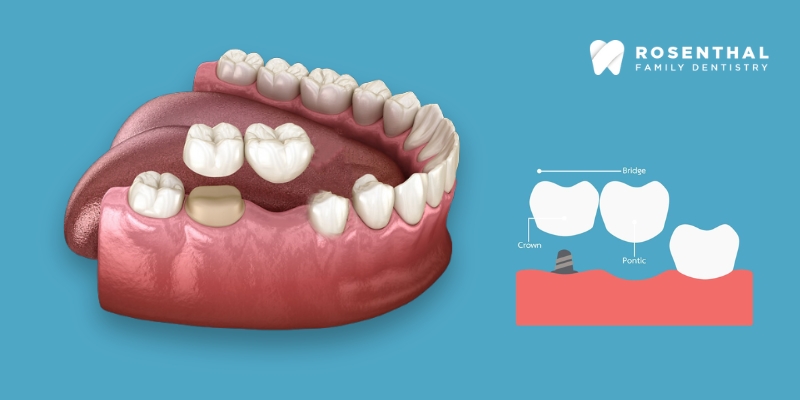Dental bridges are a standard orthodontic treatment solution for replacing missing teeth and restoring both function and aesthetics to the mouth. They are prosthetic devices that literally “bridge” the gap created by one or more missing teeth. Dental bridges come in several types, each suited to different situations depending on the patient’s oral health, preferences, and budget. This comprehensive guide will explore the various types of dental bridges available, their benefits, drawbacks, and considerations to help you make an informed decision.
Why You Need Dental Bridges
Dental bridges are essential for restoring your smile, oral function, and overall dental health. They fill gaps left by missing teeth, preventing neighboring teeth from shifting out of place. This helps maintain proper alignment and bite functionality.
Dental bridges enhance chewing and speaking abilities and support facial contours for a youthful appearance. Beyond aesthetics, they evenly distribute the forces in your bite, reducing stress on surrounding teeth.
Bridges prevent potential dental issues like gum disease and jaw joint problems by filling gaps. Overall, dental bridges are essential to dental treatment and are crucial in preserving dental health and restoring confidence in your smile.
Different Types of Dental Bridges
1. Traditional Dental Bridges
Traditional dental bridges are the most common type and are typically made of porcelain fused to metal (PFM). They consist of two crowns placed on the teeth adjacent to the gap (abutment teeth), with a pontic (artificial tooth) suspended between them. The crowns are cemented onto the abutment teeth, anchoring the pontic.
Pros:
- Strong and durable.
- Natural appearance.
- Effective for replacing one or more adjacent missing teeth.
Cons:
- The adjacent teeth must be prepared (reduced size) to accommodate the crowns.
- Potential for wear on the opposing teeth.
2. Cantilever Bridges

Cantilever bridges are similar to traditional bridges but are supported by an abutment tooth on only one side of the gap rather than both sides. This type of bridge is used when there is only one adjacent tooth next to the gap.
Pros:
- Suitable when there’s only one adjacent tooth available.
- Similar appearance to traditional bridges.
Cons:
- Places more stress on the supporting tooth.
- Less strong for replacing molars or areas with heavy chewing forces.
3. Maryland Bonded Bridges (Resin-Bonded Bridges)
Maryland-bonded bridges consist of a metal or porcelain framework with wings on each side bonded to the back of the adjacent teeth. They are primarily used to replace front teeth.
Pros:
- Minimal preparation of adjacent teeth.
- Less invasive procedure compared to traditional bridges.
- Preserves tooth structure.
Cons:
- Not suitable for areas with heavy chewing forces.
- May require replacement over time due to bonding limitations.
4. Implant-Supported Bridges
Dental implants rather than natural teeth support implant-supported bridges. Implants are surgically placed into the jawbone to serve as artificial roots, onto which the bridge is attached.
Pros:
- Prevents bone loss in the jaw.
- Stable and secure fit.
- Does not require the preparation of adjacent teeth.
Cons:
- More invasive surgical procedures.
- Longer dental treatment time.
- Higher cost compared to traditional bridges.
Tips for Choosing the Right Dental Bridge
Choosing the right dental bridge is essential for restoring your smile and oral function. There are several factors to consider when making this decision, including your oral health, budget, and personal preferences. Here’s a guide to help you navigate through the process:
1. Consultation with a Dentist

Before deciding on a dental bridge, schedule a consultation with a qualified dentist. They will assess your oral health, evaluate the condition of your remaining teeth and gums, and discuss your options based on your specific needs.
2. Understand Your Options
Familiarize yourself with the different types of dental bridges available, such as traditional, cantilever, Maryland-bonded, and implant-supported bridges. Each type has advantages and disadvantages, so understanding these options will help you make an informed decision.
3. Consider Longevity and Durability
Evaluate the longevity and durability of each type of dental bridge. Traditional bridges are durable but may require the preparation of adjacent teeth. Implant-supported bridges offer excellent stability and prevent bone loss but involve a more invasive procedure and are more expensive.
4. Assess Aesthetic Concerns
Consider the aesthetic implications of each dental bridge type. Traditional and implant-supported bridges typically provide a natural appearance, while Maryland bonded bridges may be less visible due to their minimal preparation of adjacent teeth.
5. Evaluate the oral health impact
Consider the impact of each bridge type on your oral health. Implant-supported bridges help preserve bone structure in the jaw, whereas traditional bridges may require alterations to adjacent teeth.
6. Budget Considerations
Understand the financial implications of each option. Traditional bridges are often more cost-effective upfront than implant-supported ones, which may require a higher initial investment but offer long-term benefits.
7. Discuss Maintenance Requirements
Discuss the maintenance requirements for each type of bridge with your dentist. Proper oral hygiene practices and regular dental visits are essential for maintaining the longevity and effectiveness of your dental bridge.
8. Seek Patient Reviews and Recommendations
Research patient reviews and seek recommendations from others who have undergone similar dental filling procedure. Their experiences can provide valuable insights into the effectiveness and satisfaction of different dental bridges.
9. Evaluate Comfort and Functionality
Consider how comfortable and functional each type of bridge will be for your daily activities, such as chewing and speaking. Implant-supported bridges offer stability similar to natural teeth, while other types may have different functional impacts.
10. Make an Informed Decision
After weighing these factors, collaborate with your dentist to make a well-informed decision. They can provide personalized recommendations based on your oral health status, preferences, and long-term dental goals.
Conclusion
Dental bridges offer a reliable treatment option for replacing missing teeth and improving function and appearance. In addition to being a reliable cracked tooth treatment, they offer various orthodontic benefits. By understanding the different types of dental bridges available—traditional, cantilever, Maryland-bonded, and implant-supported—you can work with your dentist to choose the option that best fits your needs. Whether you prioritize durability, aesthetics, or the preservation of natural teeth, a dental bridge solution can restore your smile with confidence and comfort.



